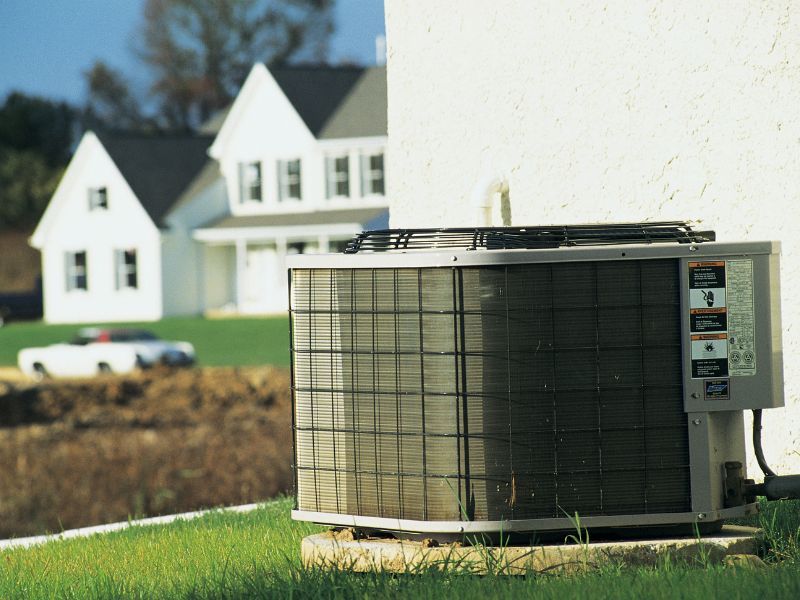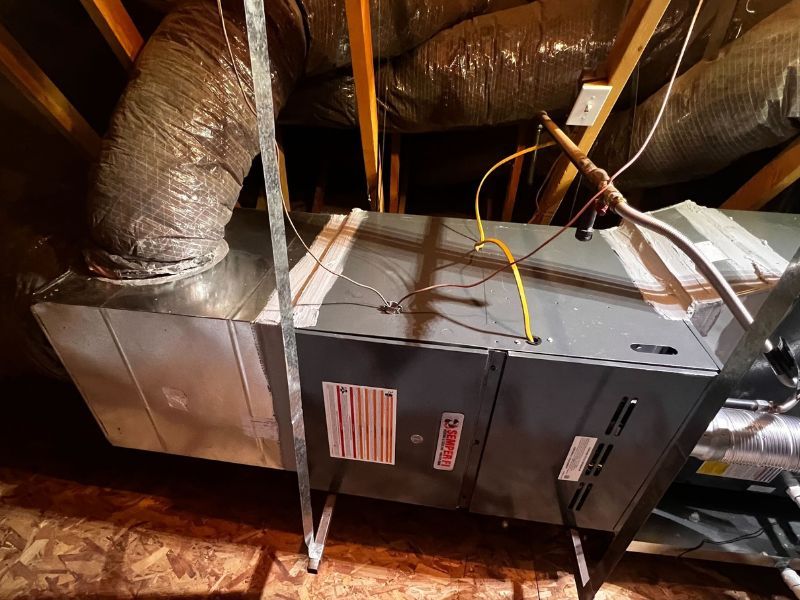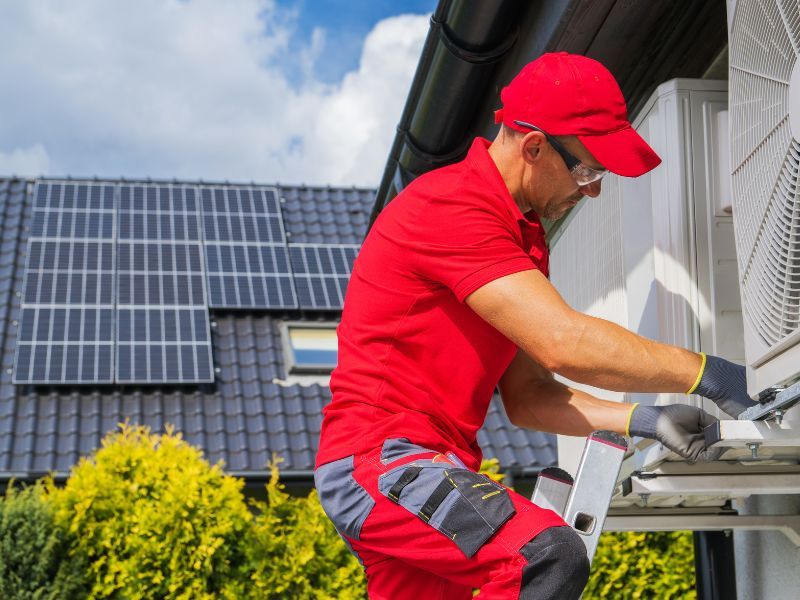How Much Does An Hvac Unit Replacement Cost?
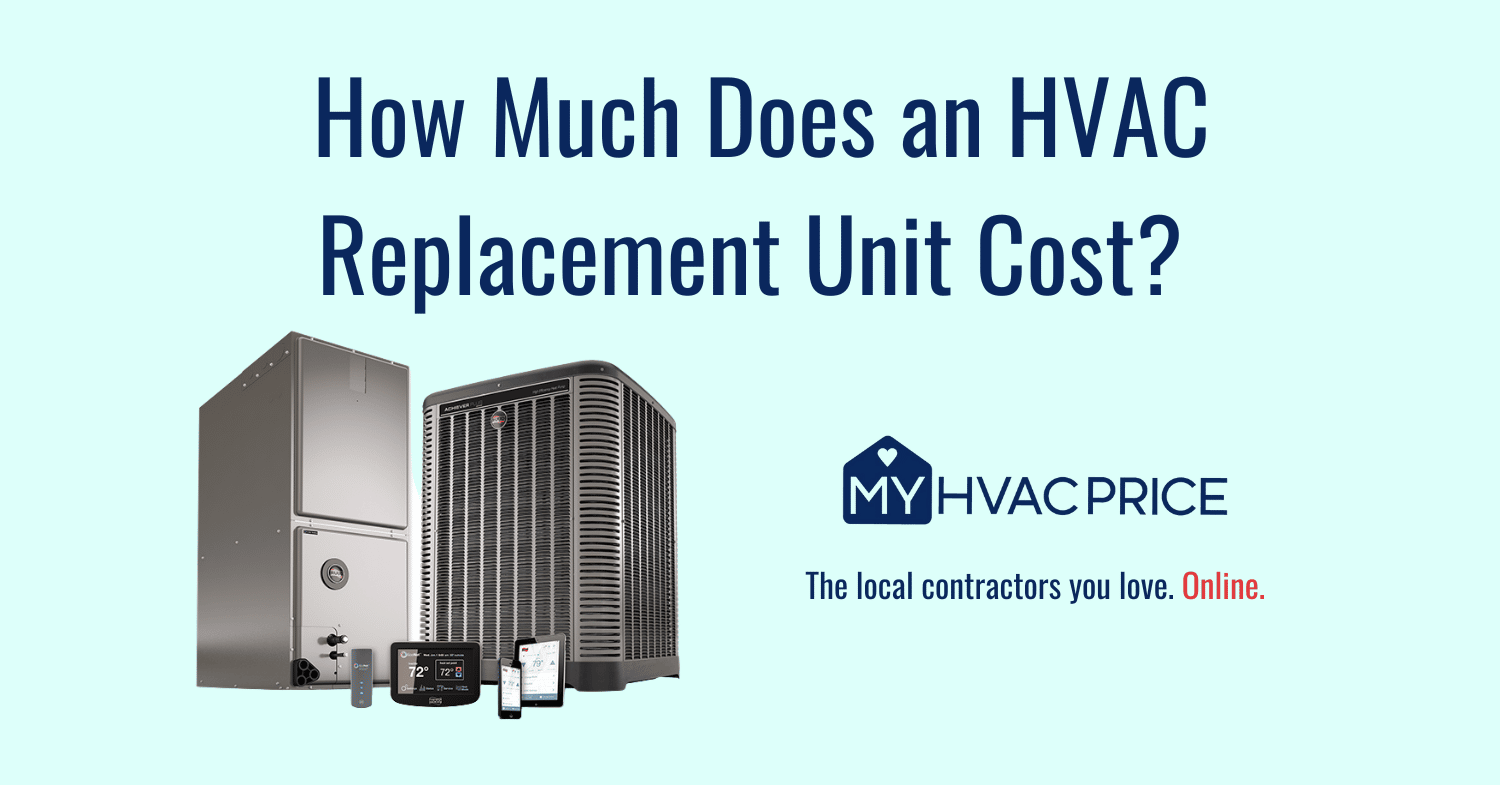
How Much Does An HVAC Unit Replacement Cost?
Hvac Unit Replacement Costs Range From $6,000 To $15,000, With The National Average At $8,500.
- Typical Gas Furnace & Air Conditioner: $8500
- Typical Heat Pump System: $8,000
- High Efficiency HVAC Systems: $12,500
Are you thinking about replacing your HVAC unit? It’s a big decision and a significant investment for most people. The cost of an HVAC unit replacement can vary depending on the size, brand, and efficiency of the unit. In this article, we’ll discuss how much you can expect to pay for an HVAC unit replacement.
Thinking of investing in a new Heating or cooling unit? We know that it’s not always easy to make such a big purchase, so MY HVAC Price wants to help make sure you get the best value for your money. We’ll look at the different factors that influence the cost of an HVAC unit replacement so that you can make an informed decision.
By understanding these factors and doing your research, you’ll be able to find a quality system that meets your needs and fits within your budget. You don’t have to break the bank when it comes to replacing your HVAC system – let us show you how! So keep reading to learn more about how much does an HVAC unit replacement cost!
Get A Fully-Installed HVAC Price Online
Hvac Unit Replacement Costs
When it comes to replacing an HVAC unit, there’s no one-size-fits-all solution. That’s why costs can range from $6,000 to $15,000. On average, though, the national cost of an HVAC unit replacement is around $8,000.
Replacing an HVAC unit isn’t just a financial decision — it’s also a lifestyle choice. By investing in a new system today, you’re investing in your home and comfort for years to come. Not only will you have peace of mind knowing that your home is well taken care of, but you’ll also be able to enjoy maximum efficiency that only comes with brand-new equipment.
It’s important to note that the actual cost of replacing an HVAC unit varies based on several factors such as size and complexity of the system and any additional features you may want installed. Additionally, labor costs can add up quickly depending on the type of installation or repair necessary. To ensure you receive the best value for your money and get the job done right the first time, it’s important to hire an experienced professional who specializes in HVAC systems.
No matter what kind of HVAC system you choose for your home, replacing it can be a great investment for your future comfort and energy savings — all at a price that fits within your budget!
Factors In Calculating Hvac Unit Replacement Cost
Have you recently asked yourself, “How much does an HVAC unit replacement cost?” Replacing an HVAC unit is no small feat and will come with a hefty price tag. The national average for an HVAC unit replacement sits at around $8,000, but costs can range anywhere from $6,000 to $15,000. But what factors determine the cost of replacing an HVAC unit?
When calculating the cost of replacing an HVAC unit there are several factors to consider. First is the size of the new unit needed. If your current system isn’t properly sized for your home you may need to upgrade to a larger system which could increase the overall cost. Additionally, if you live in a region with extreme weather conditions it may be necessary to purchase a higher efficiency system which comes with its own set of additional costs.
The installation process will also affect the total cost of replacing your HVAC unit. This is because different systems require different levels of expertise when it comes to installation and setup. If your contractor has specialized knowledge or requires additional tools or materials this could add to the final bill.
Finally, some contractors may offer special discounts for certain services or energy-efficient products that could reduce your out-of-pocket expenses when replacing an HVAC unit. Before signing any contracts be sure to ask about available discounts and compare quotes from different contractors in order to get the best deal possible on your new HVAC system.
Replacing an HVAC system can be expensive but understanding how each factor affects the total cost can help you make more informed decisions when it comes time to purchase a new one for your home. Doing research upfront and comparing quotes from different contractors can save you money in the long run while still getting you an efficient and reliable system that will last for years to come.
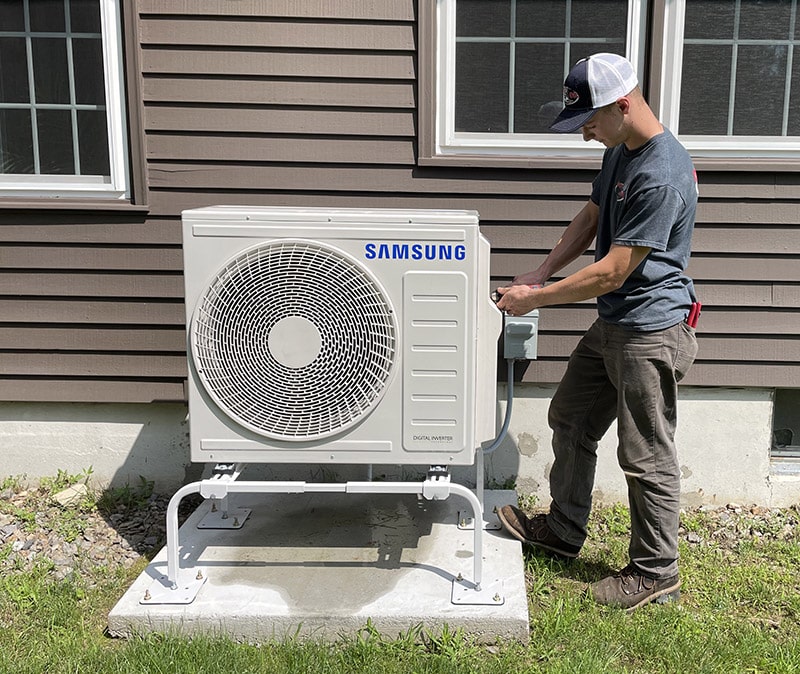
Additional Costs And Considerations
When it comes to replacing an HVAC unit, there’s more to consider than just the cost. Not only do you need to factor in the parts and labor required, but there are additional costs and considerations that must be taken into account. Let’s take a look at some of them.
First, if you have an existing unit that requires removal, this will add extra time and money. You’ll need to hire a professional for proper dismantling and disposal of the old unit. Likewise, if your current HVAC system is outdated or inefficient, you may want to consider upgrading components such as ductwork or insulation for improved performance.
Then there are energy efficiency ratings for new units that you’ll want to research before making a purchase decision. Many utility companies also offer rebates or credits for energy-efficient models, so it pays to check your local utility company’s website for any available incentives.
Finally, don’t forget about maintenance contracts when looking at HVAC replacement costs. This one-time fee gives you access to regular tune-ups that can extend the life of your equipment and improve its efficiency over time – something that can save you money in the long run!
When considering an HVAC replacement, make sure all costs and considerations are accounted for so you can make an informed decision about what’s best for your home – both financially and comfort-wise.
HVAC Unit Replacement Types
- Furnace & Air Conditioner Systems
- Heat Pump Systems
- Air Conditioner Only Systems
- Gas Furnace Only Systems
- Ductless “mini split” Systems
When it comes to replacing an HVAC unit, there are a few different types of replacements to consider. The most common type is a full replacement – where the entire unit and its components are replaced. This is often the most expensive option but can be the best choice if your unit is outdated or needs major repairs.
Another option is a partial replacement, which involves replacing only part of the system. This can be more cost-effective than a full replacement, but may not provide as much value in terms of energy efficiency and other features.
You may also want to consider installing a new HVAC unit altogether. This can come with some additional benefits, such as improved air quality or quieter operation. Of course, this will require more money up front and potentially higher energy bills over time.
Before making your decision about which type of replacement to go for, it’s important to research all of your options thoroughly and speak with professionals who understand the different types of HVAC units available on the market today. They’ll be able to recommend a solution that works best for your particular situation.
Do I Need To Replace My HVAC Unit?
Deciding whether or not to replace your HVAC unit is a big decision. It’s important to weigh the pros and cons of replacing versus repairing, as well as the cost. Knowing when it’s time to replace your HVAC unit can save you money in the long run.
The age of your HVAC system is an important factor in determining whether or not you need to replace it. If it’s more than 10 years old, chances are it’s time for a replacement. Additionally, if you’ve noticed that your energy bills have been increasing over time, this could be due to an aging system that needs to be replaced.
It’s also important to consider the efficiency of your current HVAC system. Older systems typically operate with lower efficiency ratings than newer models, resulting in higher energy bills and a less comfortable home environment. Replacing an older unit with a newer model can improve efficiency and save money on energy costs in the long run.
So if you’re facing higher energy bills or have a system that’s more than 10 years old, it may be time for a replacement HVAC unit. Consider all factors before making this decision — including cost — so that you get the best value for your money.
Hvac Unit Replacement Cost: Diy Vs. Hiring A Professional
It’s easy to forget how important the HVAC system is until it stops working properly. If you’re wondering whether or not you need to replace your HVAC unit, the answer can depend on many factors. One thing that’s certain, however, is that replacing an HVAC unit isn’t cheap. So, if you’ve decided you need a new system, it’s important to understand the differences between doing it yourself and hiring a professional.
DIY HVAC unit replacement costs will vary significantly depending on what type of system you’re looking for. The cost of the materials needed, such as ductwork and filters, can add up quickly. Plus, without experience in this area, you may have difficulty deciphering which components are necessary and which ones aren’t.
Hiring a professional can be more expensive upfront but could save you money in the long run due to their expertise and access to quality parts at better prices than DIYers usually get. A professional will also be able to install the unit correctly and safely so that it runs efficiently and lasts longer than if it were installed incorrectly.
When making your decision about how to replace your HVAC unit, consider both options thoroughly before making your choice. Think about all of the pros and cons for each option before deciding which one is best for you—it could end up saving you time and money in the long run!
Do I Need To Replace My HVAC Unit?
Deciding whether or not to replace your HVAC unit is a big decision. It’s important to weigh the pros and cons of replacing versus repairing, as well as the cost. Knowing when it’s time to replace your HVAC unit can save you money in the long run.
The age of your HVAC system is an important factor in determining whether or not you need to replace it. If it’s more than 10 years old, chances are it’s time for a replacement. Additionally, if you’ve noticed that your energy bills have been increasing over time, this could be due to an aging system that needs to be replaced.
It’s also important to consider the efficiency of your current HVAC system. Older systems typically operate with lower efficiency ratings than newer models, resulting in higher energy bills and a less comfortable home environment. Replacing an older unit with a newer model can improve efficiency and save money on energy costs in the long run.
So if you’re facing higher energy bills or have a system that’s more than 10 years old, it may be time for a replacement HVAC unit. Consider all factors before making this decision — including cost — so that you get the best value for your money.
Hvac Unit Replacement Cost: Diy Vs. Hiring A Professional
It’s easy to forget how important the HVAC system is until it stops working properly. If you’re wondering whether or not you need to replace your HVAC unit, the answer can depend on many factors. One thing that’s certain, however, is that replacing an HVAC unit isn’t cheap. So, if you’ve decided you need a new system, it’s important to understand the differences between doing it yourself and hiring a professional.
DIY HVAC unit replacement costs will vary significantly depending on what type of system you’re looking for. The cost of the materials needed, such as ductwork and filters, can add up quickly. Plus, without experience in this area, you may have difficulty deciphering which components are necessary and which ones aren’t.
Hiring a professional can be more expensive upfront but could save you money in the long run due to their expertise and access to quality parts at better prices than DIYers usually get. A professional will also be able to install the unit correctly and safely so that it runs efficiently and lasts longer than if it were installed incorrectly.
When making your decision about how to replace your HVAC unit, consider both options thoroughly before making your choice. Think about all of the pros and cons for each option before deciding which one is best for you—it could end up saving you time and money in the long run!
Get A Fully-Installed HVAC Price Online
How To Save Money On HVAC Unit Replacement Cost
When it comes to replacing your HVAC unit, there are two main options: do it yourself or hire a professional. The cost of each option can vary greatly, leaving you wondering how to save money on HVAC unit replacement cost. Here’s what you need to know.
First, DIYing is usually the less expensive option upfront, but there are potential risks associated with it. You’ll need to do your research and make sure you have all the necessary tools and parts before starting the job. Additionally, if anything goes wrong during your DIY installation, you might end up paying more for repairs or replacements down the line.
On the other hand, hiring a professional for HVAC unit replacement can be pricey in terms of labor costs. However, this is often worth it due to their expertise and experience with these types of projects. Professionals can quickly identify any problems that could arise during an installation, helping to minimize long-term repair costs.
So when it comes time to replace your HVAC unit, take some time to consider both options carefully before deciding what’s best for you. Do your research and weigh the pros and cons associated with both DIYing and hiring a professional. This will help ensure that you get the right solution at a price that works for you.
Questions To Ask About HVAC Unit Replacement Cost
When it comes to replacing an HVAC unit, cost is often a major concern. Homeowners can take some proactive steps to ensure they are getting the best deal on the replacement. But with so many questions to ask, it can be hard to know where to start. Here are some important questions you should consider when looking into an HVAC unit replacement cost.
First and foremost, what kind of guarantee does the company offer? It’s important to research the company and get a good sense of their reputation before investing in an HVAC unit. Knowing that the installation is backed by a guarantee will give homeowners peace of mind that their investment is protected.
Next, what kind of warranty is offered? While most companies offer standard warranties, some may offer extended or lifetime warranties for added protection. If a homeowner plans on living in their home long-term, they may want to invest in a longer warranty period.
It’s also important to ask about energy efficiency ratings for the new HVAC unit. Not only will this help reduce monthly energy bills, but it can also increase the value of your home in the long run. Additionally, ask about any rebate programs or special offers that could save money when purchasing an HVAC system replacement.
Finally, take time to compare quotes from multiple companies and make sure all costs are included in each estimate before making a decision. Being informed and doing your due diligence can go a long way towards finding the best deal possible on an HVAC unit replacement cost.
FAQ
Are you thinking about replacing your HVAC unit? If so, you’re probably wondering what questions you should ask and what costs to expect. To help you out, we’ve compiled the most common FAQs about HVAC unit replacement costs.
First and foremost, the biggest cost will be for the actual unit itself. This can range from a few hundred dollars for basic models to thousands of dollars for more sophisticated units. You also need to factor in installation fees which will depend on the size and complexity of the job as well as any necessary permits or inspections that may be required.
It’s also important to remember that you may need additional components or services such as new ductwork, ventilation, electrical wiring or insulation depending on your home’s layout and existing system. Be sure to ask your contractor if they offer any packages that include these items at a discounted rate.
Finally, there are often rebates available from local energy companies or government subsidies that can help offset some of the costs associated with a new HVAC unit which can save you a significant amount of money in the long run. Do some research online to see what kind of options are available in your area or speak with your contractor directly to find out more information.
With all this in mind, it’s easy to understand why it pays off to do some research before making a decision about replacing your HVAC unit. Knowing what questions to ask and understanding all potential costs ahead of time can help ensure that this important investment is one you won’t regret down the line.
Frequently Asked Questions
How Long Will A New HVAC Unit Last?
When it comes to replacing an HVAC unit, one of the most important considerations is longevity. How long will your new system last? That depends on a few factors.
The best way to ensure maximum lifespan is to have regular maintenance and tune-ups performed by a professional. This helps keep the unit running efficiently and can help identify any potential issues before they become too costly or cause major damage. It’s also important to use a quality system that has been designed and installed correctly, as this will also contribute to its longevity.
In addition, the environment in which the unit is located plays a big role in its lifespan. If the area is particularly dusty or humid, it can shorten the life expectancy of an HVAC system significantly. The same goes for temperature fluctuations; extreme cold and hot temperatures can be damaging over time.
Finally, some components may need to be replaced more frequently than others, such as filters or belts. It’s worth researching what parts of your system may need more frequent replacement so you can budget accordingly – this will help you get the most out of your investment for years to come!
What Are The Most Energy Efficient HVAC Units?
When it comes to HVAC units, energy efficiency is key. The most energy-efficient units can help you save on your monthly utility bills, protect the environment, and even qualify for tax credits. But with so many choices out there, how do you know which one is right for you?
First and foremost, look for models that are ENERGY STAR certified. These products meet strict energy-efficiency guidelines set by the US Environmental Protection Agency (EPA) and US Department of Energy (DOE). They use advanced technology to provide heating and cooling without wasting energy. Additionally, they often come with additional features such as variable speed fans or two-stage compressors to further reduce energy consumption.
Next, consider the size of the unit itself. The size of your home will determine which type of HVAC unit is best suited for you. An oversized system will cycle on and off frequently, leading to higher monthly costs and increased wear-and-tear on the system over time. On the other hand, an undersized system will struggle to keep up with demand, leading to poor comfort levels in your home. It’s important to have a qualified technician properly size your system before installing it in order to get maximum efficiency from it.
Finally, don’t forget about manufacturer warranties when selecting a new HVAC system. Most systems come with at least a 10-year warranty on parts and labor for repairs or replacements due to manufacturer defects; some even offer longer warranties up to 15 years or more. With these extended coverage plans in place, you’ll be able to rest easy knowing that any issues down the road will be covered by the manufacturer’s warranty.
No matter what type of HVAC system you ultimately choose for your home, make sure it meets all local code requirements and is installed correctly by a qualified technician in order achieve maximum efficiency levels throughout its lifetime.
What Are The Benefits Of Replacing My HVAC Unit?
Are you considering replacing your HVAC unit? There are several benefits that come with doing so. Let’s explore a few of the most important ones.
The first benefit is improved energy efficiency. Newer units have been designed to be more efficient, reducing your monthly energy costs and helping to protect the environment. You may even qualify for government rebates or tax credits if you replace your older model with an ENERGY STAR-certified one!
Another major benefit of replacing your old HVAC unit is increased comfort in your home. A newer system will provide better air flow throughout your home, helping to keep indoor temperatures consistent and comfortable no matter what the season is outside. Additionally, newer units are quieter than their older counterparts, so you won’t have to worry about loud noises disrupting any peace and quiet in your house.
Finally, when it comes time for repairs, the cost of parts and labor are typically lower for newer models than they are for older ones. Plus, many manufacturers offer warranties on their products so you can rest assured that if something does go wrong, it’ll be covered by the warranty.
Replacing an old HVAC unit can provide long-term savings on energy costs as well as increased comfort and peace of mind in knowing that repairs will likely be less expensive than if you kept using an outdated system. If you’re ready to make the switch, contact a professional today and get started on experiencing all these great benefits!
What Is The Best Size Hvac Unit For My Home?
When it comes to replacing your HVAC unit, there are several factors that come into play. One of the most important is the size of the unit you choose. The right size HVAC unit can make a huge difference in terms of comfort and energy efficiency, so it’s important to get it right.
Figuring out the best size HVAC unit for your home doesn’t have to be complicated. Start by taking measurements of each room in your house and determining how many BTUs (British Thermal Units) per hour you’ll need based on those measurements. To do this, multiply the length times width times height of each room and then multiply that number by 25 BTUs per hour. Once you’ve done that for each room, add up all the BTUs and divide them by 12,000 to get an approximate value for your total BTU needs.
When selecting an HVAC unit, make sure that it’s rated for at least 10% more than your total BTU needs for optimal efficiency and comfort. If you’re unsure about what type of HVAC system would work best in your home or what size you should choose, consult a professional who can advise you on the best options for your specific needs.
Your local HVAC specialist will be able to provide helpful guidance on which size would be most suitable for your home and budget – ensuring that you make an informed decision when replacing or upgrading your current system. Making sure that you select the right size HVAC system is essential in order to achieve maximum energy efficiency and comfort levels.
Are There Any Tax Credits Or Incentives For Replacing My HVAC Unit?
Replacing your HVAC system is a big decision. Not only can it be a significant expense, but also it’s an important choice for the comfort of your home. But did you know there may be tax credits or incentives available to help make the decision easier? Let’s take a closer look!
Tax credits are typically offered at the federal and sometimes state level to offset the cost of making energy-efficient upgrades in your home. Incentives, on the other hand, are usually offered by local energy providers. They could come in the form of rebates, discounts, or free services like free installation or free equipment.
To qualify for these types of savings, you’ll need to purchase an energy-efficient HVAC system from an approved manufacturer that meets certain efficiency requirements outlined by both the federal government and local energy provider. It’s worth doing some research to find out what’s available in your area before you commit to any particular unit.
But even if you don’t qualify for any tax credits or incentives, you can still save money by shopping around and researching different systems. You could get a better deal on a unit with higher efficiency ratings than one that doesn’t meet those requirements but costs significantly less up front.
So whether you’re looking to save money or just want peace of mind that you’re investing in something that will keep your house comfortable for years to come, it pays off to see what kind of tax credits or incentives may be available where you live!
Conclusion
Replacing an HVAC unit is a major expense, but it can also be a great investment. It’s important to understand the costs involved and to evaluate your options before deciding which unit is best for you. An energy-efficient unit can save you money in the long run, and there may even be tax credits or incentives available to help offset the cost of replacement. Ultimately, you’ll need to weigh all of these considerations when determining how much your new HVAC unit will cost.
Replacing an outdated HVAC system with a more efficient model can provide numerous benefits. It can enhance the comfort of your home, improve the air quality inside, reduce energy consumption, and potentially save you money on utility bills over time. I encourage you to do some research and consider all of your options before making a decision about which unit is right for you.
In conclusion, while replacing an HVAC system can be expensive, it also comes with many benefits that make it worthwhile in the long run. With careful consideration of size and efficiency requirements along with potential tax credits or incentives, I’m confident that you’ll be able to find an HVAC unit that fits both your needs and budget. Good luck!
HVAC System Cost & HVAC Reviews
Related Pages
Categories
